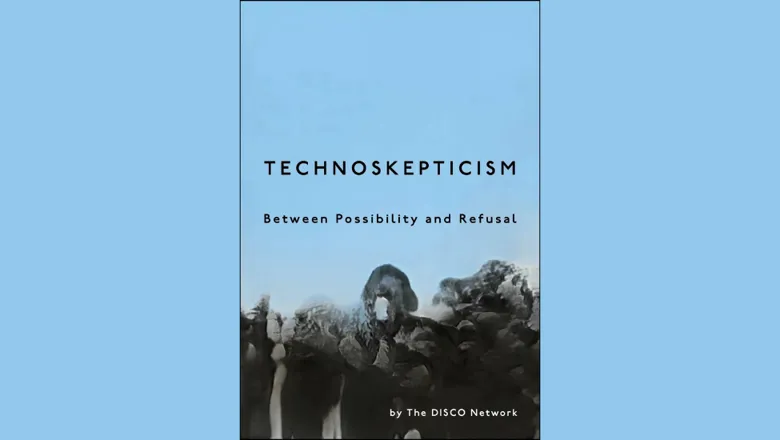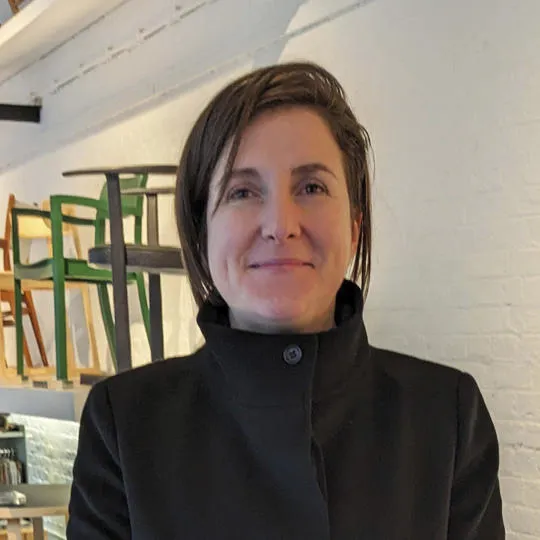Technoskepticism: Between Possibility and Refusal

The Department of Digital Humanities and the Centre for Digital Culture at King’s College London are delighted to host the launch of the DISCO Network’s Technoskepticism: Between Possibility and Refusal (Stanford University Press, 2025). The event will be chaired by Dr Zeena Feldman (KCL).
From Munchausen by Tiktok to wellness apps to online communities to AI, the DISCO Network explores the possibilities that technoskepticism can create. This is a book about possibility and refusal in relation to new technologies. Though refusal is an especially powerful mode—particularly for those who have historically not been given the option to say no—people of colour and disabled people have long navigated the space between saying yes and saying no to the newest technologies. Technoskepticism relates some of these stories to reveal the possibilities skepticism can create.
This launch event will consider three strands of technoskepticism: the first focused on disability, the creative use of wellness apps, and the desire for diagnosis; the second on digital nostalgia and home for Black and Asian users who produced communities online before home pages gave way to profiles; and the third focused on the violence inherent in A.I.-generated Black bodies and the possibilities for Black style in the age of A.I. Acknowledging how the urge to refuse new technologies emerges from specific racialised histories, the authors will also consider how care can look like an exuberant embrace of the new.
Please note this is a hybrid event. Guests are invited to join us in-person in London or online via MS Teams. Online attendees will be emailed a Teams link 24 hours before the event.
Speakers' Info:
Dr Rianna Walcott is an Assistant Professor of Communication at the University of Maryland, and Associate Director of the Black Communication and Technology (BCaT) Lab as part of the DISCO Network. Rianna received a PhD in Digital Humanities from King's College London for her research on Black (and specifically Black British) communication practices across social media platforms, locating the evolution of a hybrid ‘Black British’ identity against the wider Black diaspora. She combines digital research, Black feminist praxis, postcolonialism, arts and culture, and mental health advocacy in her work. In the time left over, she moonlights as a jazz singer.
Dr Aaron Dial is an Assistant Professor of Film & Media Studies and Africana & Latin American Studies at Colgate University. His monograph-in-progress, ‘Deadstock, A Philosophy of Sneakers in the Afterlife of Black Bodies’, excavates sneakers from the strict confines of culture and fashion, asserting their existence as an object wherein bodies act and that acts upon bodies and spaces. Aaron is a big-time sneakerhead with over 60 pairs in his collection. You can catch him doing anything from bumping the latest music release (he’s learning to DJ!) to watching some dope anime to obsessing over NBA basketball. If you have any questions, just ask – preferably over a nice bourbon.
Dr Kevin C. Winstead is an Assistant Professor of Critical Media and AI Studies within the African American Studies and Sociology Departments at the University of Florida. His research focuses on critical information studies, social movements, and digital media, specifically on transglobal disinformation. His work can be found in Ethnic and Racial Studies, Sociology Compass, and Critical Intersections in Contemporary Curriculum & Pedagogy, Information Age Publishing.
Dr Jeff Nagy is an Assistant Professor of Artificial Intelligence and Critical Data Studies in the Department of Communication and Media Studies at York University. Previously, he was a DISCO Network Postdoctoral Fellow at the University of Michigan, where he ran Search Engines, a programming series centered around the arts, emerging technology, and social justice. He is a historian of computing and AI focused on the intersections between that history with disability and psychological and psychiatric science. He holds a PhD in Communication from Stanford University. His research has appeared in Just Tech, New Media & Society, Technology & Culture, and elsewhere.
Dr David Adelman (he/him/his) is a lecturer, interdisciplinary scholar, and maker, and a postdoctoral research fellow in the Digital Accessible Futures lab at the University of Michigan. His research interests center disability and crip studies, with a particular emphasis on disability media studies, digital disability cultures, disability film studies, and critical sexuality studies. Through an interdisciplinary crip studies/feminist lens, he pursues questions which emerge at the intersection of power, culture, technology, identity, and desire. He also maintains an artistic practice which centers experimental video and remix to explore disability culture, aesthetics, and politics.
Professor Lisa Nakamura (she/her/hers) is the Gwendolyn Calvert Baker Collegiate Professor in the Department of American Culture, and the founding Director of the Digital Studies Institute, at the University of Michigan, Ann Arbor. Since 1994, Nakamura has written books and articles on digital bodies, race, and gender in online environments, on toxicity in video game culture, and the many reasons that Internet research needs ethnic and gender studies. These books include Race After the Internet (co-edited with Peter Chow-White, Routledge, 2011); Digitizing Race: Visual Cultures of the Internet (Minnesota, 2007); Cybertypes: Race, Ethnicity, and Identity on the Internet (Routledge, 2002); and Race in Cyberspace (co-edited with Beth Kolko and Gil Rodman, Routledge, 2000).
Dr Lida Zeitlin-Wu is a media historian and theorist who teaches in the Media Studies program and the interdisciplinary MA in the Humanities at Old Dominion University. Originally trained in modern languages, she now researches the rationalization and commodification of sensory experience—particularly color—from the late 19th century to the present. She received her PhD in Film & Media from UC Berkeley in 2022, and from 2022-2024 was a Postdoctoral Fellow in the Digital Studies Institute at the University of Michigan. She is working on a book titled How Color Became a Technology: The Making of Chromatic Capitalism.
About the DISCO Network
The DISCO Network (Digital Inquiry Speculation Collaboration Optimism Network) is an intergenerational collective of researchers, artists, technologists, policymakers, and practitioners working together to challenge digital social and racial inequalities.
Search for another event

